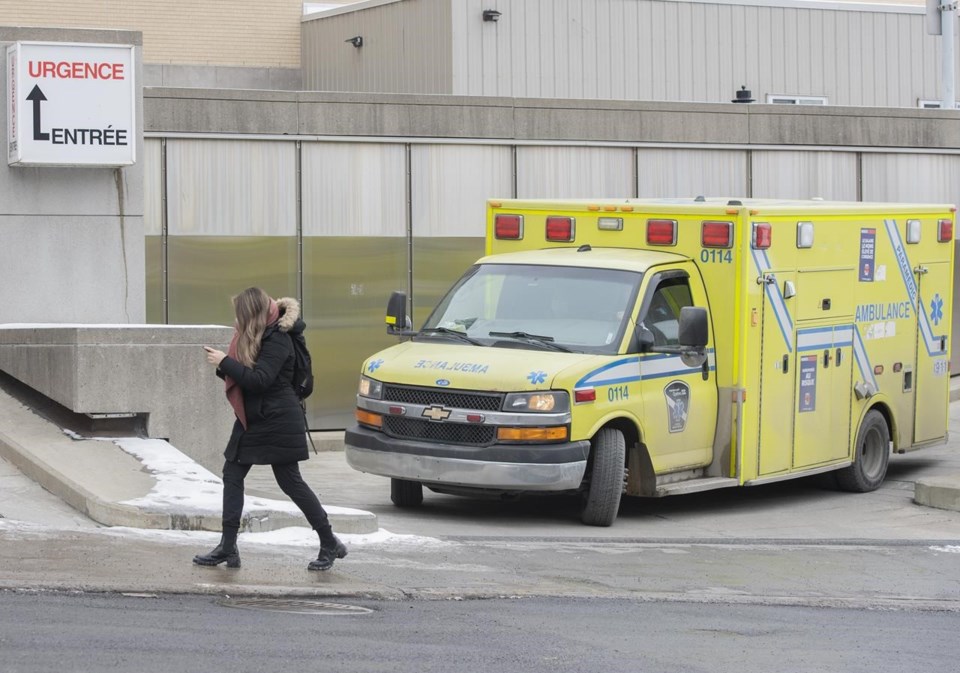MONTREAL — Overcrowding in Quebec hospitals is "out of control" and putting the lives of patients at risk, says a group representing chief doctors in the province's emergency departments.
ER occupancy rates are among the highest ever recorded in the province, said Dr. Sophie Gosselin, a spokeswoman for Regroupement des chefs d'urgence du Québec. A lack of co-ordination and a shortage of resources have left many ERs caring for patients who should be moved to hospital wards, she added.
"We are saying we can't let things get any worse, it's going to be really dangerous," Gosselin said in an interview Monday.
On Friday, less than two weeks after officials confirmed they were investigating two deaths at a Montreal-area ER, her group sent a letter to Health Minister Christian Dubé warning that the situation in Quebec's emergency rooms is "out of control."
Those high-profile deaths are just the tip of the iceberg, Dr. Marie-Maud Couture, the group's president, wrote to Dubé. "Overcrowding in the emergency department leads to daily mortality."
A spokesman for Quebec's health minister did not respond to a request for comment.
Health data website Index Santé said the average emergency department occupancy in Quebec on Monday afternoon was 134 per cent; that figure hasn't been below 100 per cent since Nov. 12. Montreal's Jewish General Hospital was the most crowded, at 217 per cent occupancy, while the Hôtel-Dieu de Sorel northeast of Montreal was at 200 per cent.
According to provincial government data, 32 per cent of ER patients spent more than 24 hours waiting on a stretcher in the seven days leading up to Dec. 11, the most recent date for which data is available, with patients spending an average of 19 hours on a stretcher.
Because of the bottlenecks in ERs, patients with chest pain might not be seen before they have a heart attack, and older people with broken bones will have to wait in pain, Gosselin said.
"You can't leave these people waiting for too long and that's what's happening right now, our emergency stretchers are clogged by patients who are stabilized and are waiting to have the rest of their treatment on the hospital ward," said Gosselin, who is the head of the emergency department at the regional health authority in Montérégie-Centre, near Montreal.
ERs closely monitor the length of time it takes to triage patients, and other health-care metrics, but hospital wards do not, Gosselin said, adding that data collecting will have to be expanded across the health system if Quebec hospitals are going to address the issues leading to ER overcrowding.
Dr. Guillaume Lacombe, the vice-president of the Quebec association of medical specialists who practise in emergency rooms, said severe ER bottlenecks are primarily in the greater Montreal area. Lacombe, who practises at the Lanaudière regional hospital, near Montreal, said capacity in his emergency department reached 280 per cent one day last week.
The situation is being exacerbated by the circulation of respiratory viruses, and pressure tactics by health-care worker unions that are negotiating a new collective agreement with the provincial government, Lacombe said.
Dr. Judy Morris, head of an association of Quebec ER doctors, said Quebec's hospital system has become so fragile that even a small rise in the number of patients in the emergency department can have a major impact.
Overcapacity protocols have been developed that would transfer some patients waiting on stretchers to less busy wards, Morris said, but they haven't been implemented. “If we cannot add beds (in emergency rooms), if we cannot add personnel, we’ve got to share the burden."
Many patients hospitalized in Quebec don't need hospital-level care, she added, but they can't be released because home care resources or long-term care beds are not available. About 14 per cent of hospital patients are waiting for a bed in a long-term care facility, Morris said.
“If we can free up those beds right away, we could probably relieve some of the pressure that’s on the emergency rooms,” she said.
This report by The Canadian Press was first published Dec. 18, 2023.
Jacob Serebrin, The Canadian Press




